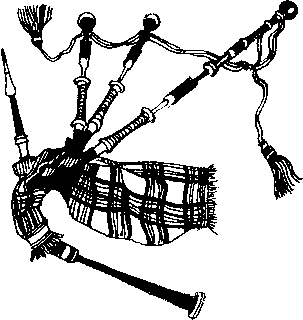Firstly you must learn how to read music. This takes quite a while, especially if you do not play any other instrument. You will also find that you may be discouraged if you hear people of your own age playing better than you. This is only a temporary setback.
Once you have learned how to read music and the basic 'fingering', you then progress to learn the ornamentation. This is used to break up the notes and to give the music more colour. 'Grace notes' as they are called are one sixteenth of a beat and when you have three or four together they make a pleasant and complicated movement.
After you have mastered these basic techniques you are now ready to start playing a set of bagpipes Up till now you have been learning on a practise chanter which is blown like a recorder. Starting on the bagpipes is probably the biggest bother, and many give up.
If you persevere then you are soon able to play them with little effort.
![]()
 |
Starting on the pipes opens new frontiers on which to learn. One of the most difficult is to
learn to tune them. Resting on your shoulder whilst playing are the drones. To tune these you slide them up or down until they are tuned to an octave below the lowest 'B' on the chanter, to tune the biggest drone you must tune it to an octave below the other two. Tuning the chanter is a little more difficult. The only way to tune this is to adjust the actual reed, i.e. pull it out slightly to 'flatten' it and push it in slightly to 'sharpen' it. |
After about three years of playing you may start playing at concerts and dinners etc. You will also start meeting people that you may not otherwise have met.
You may get paid £20 and your taxi fare for playing at the Hilton for five or six minutes or be paid £50 for two five minute sessions at Caesar's Palace. And sometimes they pay you just to go away.
This is when all your practising begins to pay off.
Michael Maguire 5C